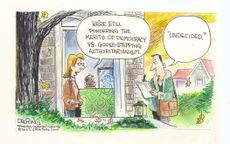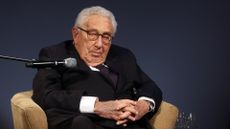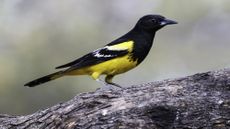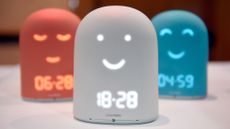Young teen wins top science prize for soap that can treat skin cancer
Memory of Ethiopian workers out in the sun inspired US schoolboy to make cell-reviving soap
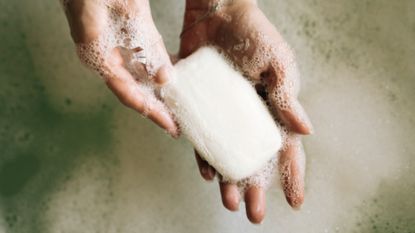
A 14-year-old boy has been named "America's top young scientist" after developing a bar of soap that could help treat melanoma.
Heman Bekele, a ninth-grader from Virginia, won the 3M Young Scientist Challenge after pitching a bar of soap, called Skin Cancer Treating Soap (SCTS), made from compounds that could "reactivate dendritic cells that guard human skin", said The Guardian. This means they can fight cancer cells. He declared in his submission that he wanted to cure cancer "one bar of soap at a time".
Bekele moved to the US at the age of four, and his idea "came from the early years of his life in Ethiopia", said The Washington Post. He wondered how many people he'd seen working outside were "at risk of sun exposure" and his memories "fueled his decision to focus his research on skin cancer".
Subscribe to The Week
Escape your echo chamber. Get the facts behind the news, plus analysis from multiple perspectives.

Sign up for The Week's Free Newsletters
From our morning news briefing to a weekly Good News Newsletter, get the best of The Week delivered directly to your inbox.
From our morning news briefing to a weekly Good News Newsletter, get the best of The Week delivered directly to your inbox.
Bekele is a self-taught programmer, according to Wion, and he describes himself as "passionate about medicine, programming and making an impact".
He wanted his product to be something that was "as much of a constant in people's lives as possible" and was "most convenient and most trustworthy", he said. Creating a prototype with a combination of ingredients that could work effectively "took months of trial and error", and Bekele used "computer modeling to determine the formula". Although "similar creams and ointments exist", he doesn't believe soap has been used to fight cancers in their early stages, The Washington Post added.
Bekele hopes he can use the $25,000 prize to "refine his innovation", which costs $0.50 (40p) to make, and create a non-profit organisation "to distribute the soap to communities in need" in the next five years, said USA Today. This plan includes seeking approval from the Food and Drug Administration (FDA), said The Washington Post. Bekele added: "There is still a lot left to do."

Continue reading for free
We hope you're enjoying The Week's refreshingly open-minded journalism.
Subscribed to The Week? Register your account with the same email as your subscription.
Sign up to our 10 Things You Need to Know Today newsletter
A free daily digest of the biggest news stories of the day - and the best features from our website
Keumars Afifi-Sabet is a freelance writer at The Week Digital, and is the technology editor on Live Science, another Future Publishing brand. He was previously features editor with ITPro, where he commissioned and published in-depth articles around a variety of areas including AI, cloud computing and cybersecurity. As a writer, he specialises in technology and current affairs. In addition to The Week Digital, he contributes to Computeractive and TechRadar, among other publications.
-
 'In Ukraine, sadly, promises are hard to keep'
'In Ukraine, sadly, promises are hard to keep'Instant Opinion Opinion, comment and editorials of the day
By Harold Maass, The Week US Published
-
 Today's political cartoons - December 1, 2023
Today's political cartoons - December 1, 2023Cartoons Friday's cartoons - the undecided voter, Kissinger's last stand, and more
By The Week US Published
-
 Quiz of The Week: 25 - 1 December
Quiz of The Week: 25 - 1 DecemberPuzzles and Quizzes Have you been paying attention to The Week's news?
By Harriet Marsden, The Week UK Published
-
 Scotland bids farewell to giant pandas
Scotland bids farewell to giant pandasSpeed Read Animals soon to begin journey back to China as loan agreement comes to an end
By Julia O'Driscoll, The Week UK Published
-
 How Iceland deals with volcanic activity
How Iceland deals with volcanic activityThe Explainer Scientists are closely monitoring seismic activity as threat of eruption looms
By Julia O'Driscoll, The Week UK Published
-
 Birds won't be named after humans anymore in an effort to eliminate racist links
Birds won't be named after humans anymore in an effort to eliminate racist linksSpeed Read A number of North American bird species are currently named after historically racist figures
By Justin Klawans, The Week US Published
-
 Cigarette-style warning labels on meat could cut consumption, say scientists
Cigarette-style warning labels on meat could cut consumption, say scientistsSpeed Read The UK's national food strategy aims to cut meat consumption by 30% by 2032
By Sorcha Bradley, The Week UK Published
-
 The moon is older than we thought
The moon is older than we thoughtSpeed Read New data adds 40 million years to the satellite's age
By Devika Rao, The Week US Published
-
 New study suggests hitting the snooze button may be no bad thing
New study suggests hitting the snooze button may be no bad thingSpeed Read People who delay getting up perform better in some cognitive tests, research finds
By Arion McNicoll, The Week UK Published
-
 Yes, satellites could fall from the sky
Yes, satellites could fall from the skySpeed Read Debris from thousands of satellites could cause injuries
By Devika Rao, The Week US Published
-
 Russian lunar spacecraft crashes into the moon
Russian lunar spacecraft crashes into the moonSpeed Read
By Justin Klawans Published

